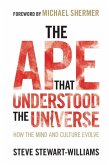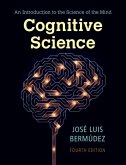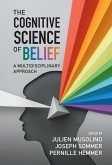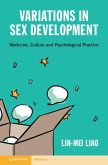44,95 €
44,95 €
inkl. MwSt.
Sofort per Download lieferbar

22 °P sammeln
44,95 €
Als Download kaufen

44,95 €
inkl. MwSt.
Sofort per Download lieferbar

22 °P sammeln
Jetzt verschenken
Alle Infos zum eBook verschenken
44,95 €
inkl. MwSt.
Sofort per Download lieferbar
Alle Infos zum eBook verschenken

22 °P sammeln
- Format: PDF
- Merkliste
- Auf die Merkliste
- Bewerten Bewerten
- Teilen
- Produkt teilen
- Produkterinnerung
- Produkterinnerung

Bitte loggen Sie sich zunächst in Ihr Kundenkonto ein oder registrieren Sie sich bei
bücher.de, um das eBook-Abo tolino select nutzen zu können.
Hier können Sie sich einloggen
Hier können Sie sich einloggen
Sie sind bereits eingeloggt. Klicken Sie auf 2. tolino select Abo, um fortzufahren.

Bitte loggen Sie sich zunächst in Ihr Kundenkonto ein oder registrieren Sie sich bei bücher.de, um das eBook-Abo tolino select nutzen zu können.
This popular textbook presents a unified and up-to-date introduction to the interdisciplinary field of cognitive science.
- Geräte: PC
- mit Kopierschutz
- eBook Hilfe
- Größe: 15.22MB
- FamilySharing(5)
Andere Kunden interessierten sich auch für
![Ape that Understood the Universe (eBook, PDF) Ape that Understood the Universe (eBook, PDF)]() Steve Stewart-WilliamsApe that Understood the Universe (eBook, PDF)17,95 €
Steve Stewart-WilliamsApe that Understood the Universe (eBook, PDF)17,95 €![Much Like Us (eBook, PDF) Much Like Us (eBook, PDF)]() Norbert SachserMuch Like Us (eBook, PDF)17,95 €
Norbert SachserMuch Like Us (eBook, PDF)17,95 €![Give Yourself a Nudge (eBook, PDF) Give Yourself a Nudge (eBook, PDF)]() Ralph L. KeeneyGive Yourself a Nudge (eBook, PDF)17,95 €
Ralph L. KeeneyGive Yourself a Nudge (eBook, PDF)17,95 €![Cognitive Science (eBook, ePUB) Cognitive Science (eBook, ePUB)]() Jose Luis BermudezCognitive Science (eBook, ePUB)44,95 €
Jose Luis BermudezCognitive Science (eBook, ePUB)44,95 €![Cognitive Behavioral Coping Skills Workbook for PTSD (eBook, PDF) Cognitive Behavioral Coping Skills Workbook for PTSD (eBook, PDF)]() Matthew T. TullCognitive Behavioral Coping Skills Workbook for PTSD (eBook, PDF)14,95 €
Matthew T. TullCognitive Behavioral Coping Skills Workbook for PTSD (eBook, PDF)14,95 €![Cognitive Science of Belief (eBook, PDF) Cognitive Science of Belief (eBook, PDF)]() Cognitive Science of Belief (eBook, PDF)39,95 €
Cognitive Science of Belief (eBook, PDF)39,95 €![Variations in Sex Development (eBook, PDF) Variations in Sex Development (eBook, PDF)]() Lih-Mei LiaoVariations in Sex Development (eBook, PDF)44,95 €
Lih-Mei LiaoVariations in Sex Development (eBook, PDF)44,95 €-
-
-
This popular textbook presents a unified and up-to-date introduction to the interdisciplinary field of cognitive science.
Dieser Download kann aus rechtlichen Gründen nur mit Rechnungsadresse in A, B, BG, CY, CZ, D, DK, EW, E, FIN, F, GR, HR, H, IRL, I, LT, L, LR, M, NL, PL, P, R, S, SLO, SK ausgeliefert werden.
Produktdetails
- Produktdetails
- Verlag: Cambridge University Press
- Erscheinungstermin: 10. November 2022
- Englisch
- ISBN-13: 9781009075282
- Artikelnr.: 70909561
- Verlag: Cambridge University Press
- Erscheinungstermin: 10. November 2022
- Englisch
- ISBN-13: 9781009075282
- Artikelnr.: 70909561
- Herstellerkennzeichnung Die Herstellerinformationen sind derzeit nicht verfügbar.
José Luis Bermúdez's research interests are interdisciplinary in nature at the intersection of philosophy, psychology, and neuroscience. His many books include The Paradox of Self-Consciousness (MIT Press, 1998), which analyzes the nature of self-awareness; Thinking without Words (Oxford, 2003), which offers a model for thinking about the cognitive achievements and abilities of prelinguistic infants and nonlinguistic humans, and Decision Theory and Rationality (Oxford, 2009), which explores tensions in how the concept of rationality is defined and formalized in different academic disciplines. Recent books include Understanding "I": Language and Thought, published by Oxford University Press in 2017 and The Bodily Self: Selected Essays by MIT Press in 2018. His most recent book, The Power of Frames (Cambridge, 2020) was supported by an ACLS fellowship for 2018-2019 and an NEH Summer Stipend for 2018. A target article with peer commentary based on The Power of Frames appeared in Behavioral and Brain Sciences (2022).
Preface
Introduction: the challenge of cognitive science
Part I. Historical Landmarks: 1. The prehistory of cognitive science
2. The discipline matures: three milestones
3. The turn to the brain
Part II. Models and Tools: 4. Physical symbol systems and the language of thought
5. Neural networks and distributed information processing
6. Applying dynamical systems theory to model the mind
7. Bayesianism in cognitive science
8. Modules and architectures
9. Strategies for brain mapping
Part III. Applications: 10. Models of language learning
11. Object perception and folk physics
12. Machine learning: from expert systems to deep learning
13. Exploring mindreading
14. Robotics: from GOFAI to situated cognition and behavior-based robotics
15. The cognitive science of consciousness
16. The emotions: from cognitive science to affective science
17. Looking ahead: challenges and opportunities
Glossary
References
Index.
Introduction: the challenge of cognitive science
Part I. Historical Landmarks: 1. The prehistory of cognitive science
2. The discipline matures: three milestones
3. The turn to the brain
Part II. Models and Tools: 4. Physical symbol systems and the language of thought
5. Neural networks and distributed information processing
6. Applying dynamical systems theory to model the mind
7. Bayesianism in cognitive science
8. Modules and architectures
9. Strategies for brain mapping
Part III. Applications: 10. Models of language learning
11. Object perception and folk physics
12. Machine learning: from expert systems to deep learning
13. Exploring mindreading
14. Robotics: from GOFAI to situated cognition and behavior-based robotics
15. The cognitive science of consciousness
16. The emotions: from cognitive science to affective science
17. Looking ahead: challenges and opportunities
Glossary
References
Index.
Preface
Introduction: the challenge of cognitive science
Part I. Historical Landmarks: 1. The prehistory of cognitive science
2. The discipline matures: three milestones
3. The turn to the brain
Part II. Models and Tools: 4. Physical symbol systems and the language of thought
5. Neural networks and distributed information processing
6. Applying dynamical systems theory to model the mind
7. Bayesianism in cognitive science
8. Modules and architectures
9. Strategies for brain mapping
Part III. Applications: 10. Models of language learning
11. Object perception and folk physics
12. Machine learning: from expert systems to deep learning
13. Exploring mindreading
14. Robotics: from GOFAI to situated cognition and behavior-based robotics
15. The cognitive science of consciousness
16. The emotions: from cognitive science to affective science
17. Looking ahead: challenges and opportunities
Glossary
References
Index.
Introduction: the challenge of cognitive science
Part I. Historical Landmarks: 1. The prehistory of cognitive science
2. The discipline matures: three milestones
3. The turn to the brain
Part II. Models and Tools: 4. Physical symbol systems and the language of thought
5. Neural networks and distributed information processing
6. Applying dynamical systems theory to model the mind
7. Bayesianism in cognitive science
8. Modules and architectures
9. Strategies for brain mapping
Part III. Applications: 10. Models of language learning
11. Object perception and folk physics
12. Machine learning: from expert systems to deep learning
13. Exploring mindreading
14. Robotics: from GOFAI to situated cognition and behavior-based robotics
15. The cognitive science of consciousness
16. The emotions: from cognitive science to affective science
17. Looking ahead: challenges and opportunities
Glossary
References
Index.







